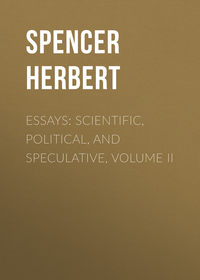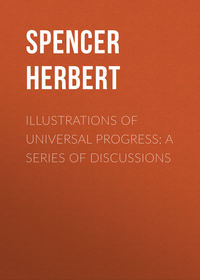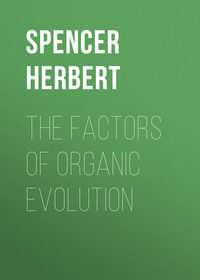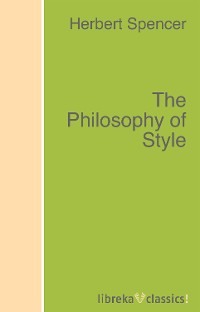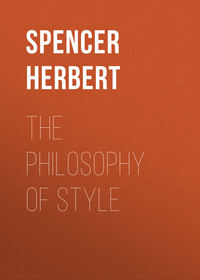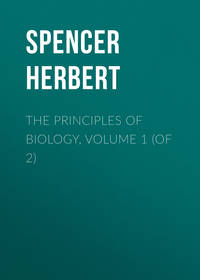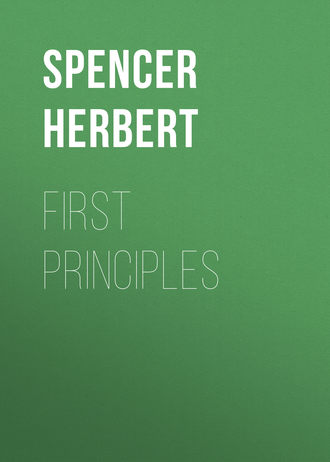 полная версия
полная версияFirst Principles
While then it is impossible to form any idea of Force in itself, it is equally impossible to comprehend either its mode of exercise or its law of variation.
§ 19. Turning now from the outer to the inner world, let us contemplate, not the agencies to which we ascribe our subjective modifications, but the subjective modifications themselves. These constitute a series. Difficult as we find it distinctly to separate and individualize them, it is nevertheless beyond question that our states of consciousness occur in succession.
Is this chain of states of consciousness infinite or finite? We cannot say infinite; not only because we have indirectly reached the conclusion that there was a period when it commenced, but also because all infinity is inconceivable – an infinite series included. We cannot say finite; for we have no knowledge of either of its ends. Go back in memory as far as we may, we are wholly unable to identify our first states of consciousness: the perspective of our thoughts vanishes in a dim obscurity where we can make out nothing. Similarly at the other extreme. We have no immediate knowledge of a termination to the series at a future time; and we cannot really lay hold of that temporary termination of the series reached at the present moment. For the state of consciousness recognized by us as our last, is not truly our last. That any mental affection may be contemplated as one of the series, it must be remembered —represented in thought, not presented. The truly last state of consciousness is that which is passing in the very act of contemplating a state just past – that in which we are thinking of the one before as the last. So that the proximate end of the chain eludes us, as well as the remote end.
“But,” it may be said, “though we cannot directly know consciousness to be finite in duration, because neither of its limits can be actually reached; yet we can very well conceive it to be so.” No: not even this is true. In the first place, we cannot conceive the terminations of that consciousness which alone we really know – our own – any more than we can perceive its terminations. For in truth the two acts are here one. In either case such terminations must be, as above said, not presented in thought, but represented; and they must be represented as in the act of occurring. Now to represent the termination of consciousness as occurring in ourselves, is to think of ourselves as contemplating the cessation of the last state of consciousness; and this implies a supposed continuance of consciousness after its last state, which is absurd. In the second place, if we regard the matter objectively – if we study the phenomena as occurring in others, or in the abstract, we are equally foiled. Consciousness implies perpetual change and the perpetual establishment of relations between its successive phases. To be known at all, any mental affection must be known as such or such – as like these foregoing ones or unlike those: if it is not thought of in connexion with others – not distinguished or identified by comparison with others, it is not recognized – is not a state of consciousness at all. A last state of consciousness, then, like any other, can exist only through a perception of its relations to previous states. But such perception of its relations must constitute a state later than the last, which is a contradiction. Or to put the difficulty in another form: – If ceaseless change of state is the condition on which alone consciousness exists, then when the supposed last state has been reached by the completion of the preceding change, change has ceased; therefore consciousness has ceased; therefore the supposed last state is not a state of consciousness at all; therefore there can be no last state of consciousness. In short, the perplexity is like that presented by the relations of Motion and Rest. As we found it was impossible really to conceive Rest becoming Motion or Motion becoming Rest; so here we find it is impossible really to conceive either the beginning or the ending of those changes which constitute consciousness.
Hence, while we are unable either to believe or to conceive that the duration of consciousness is infinite, we are equally unable either to know it as finite, or to conceive it as finite.
§ 20. Nor do we meet with any greater success when, instead of the extent of consciousness, we consider its substance. The question – What is this that thinks? admits of no better solution than the question to which we have just found none but inconceivable answers.
The existence of each individual as known to himself, has been always held by mankind at large, the most incontrovertible of truths. To say – “I am as sure of it as I am sure that I exist,” is, in common speech, the most emphatic expression of certainty. And this fact of personal existence, testified to by the universal consciousness of men, has been made the basis of sundry philosophies; whence may be drawn the inference, that it is held by thinkers, as well as by the vulgar, to be beyond all facts unquestionable.
Belief in the reality of self, is, indeed, a belief which no hypothesis enables us to escape. What shall we say of these successive impressions and ideas which constitute consciousness? Shall we say that they are the affections of something called mind, which, as being the subject of them, is the real ego? If we say this, we manifestly imply that the ego is an entity. Shall we assert that these impressions and ideas are not the mere superficial changes wrought on some thinking substance, but are themselves the very body of this substance – are severally the modified forms which it from moment to moment assumes? This hypothesis, equally with the foregoing, implies that the individual exists as a permanent and distinct being; since modifications necessarily involve something modified. Shall we then betake ourselves to the sceptic’s position, and argue that we know nothing more than our impressions and ideas themselves – that these are to us the only existences; and that the personality said to underlie them is a mere fiction? We do not even thus escape; since this proposition, verbally intelligible but really unthinkable, itself makes the assumption which it professes to repudiate. For how can consciousness be wholly resolved into impressions and ideas, when an impression of necessity implies something impressed? Or again, how can the sceptic who has decomposed his consciousness into impressions and ideas, explain the fact that he considers them as his impressions and ideas? Or once more, if, as he must, he admits that he has an impression of his personal existence, what warrant can he show for rejecting this impression as unreal while he accepts all his other impressions as real? Unless he can give satisfactory answers to these queries, which he cannot, he must abandon his conclusions; and must admit the reality of the individual mind.
But now, unavoidable as is this belief – established though it is, not only by the assent of mankind at large, endorsed by divers philosophers, but by the suicide of the sceptical argument – it is yet a belief admitting of no justification by reason: nay, indeed, it is a belief which reason, when pressed for a distinct answer, rejects. One of the most recent writers who has touched upon this question – Mr Mansel – does indeed contend that in the consciousness of self, we have a piece of real knowledge. The validity of immediate intuition he holds in this case unquestionable: remarking that “let system-makers say what they will, the unsophisticated sense of mankind refuses to acknowledge that mind is but a bundle of states of consciousness, as matter is (possibly) a bundle of sensible qualities.” On which position the obvious comment is, that it does not seem altogether a consistent one for a Kantist, who pays but small respect to “the unsophisticated sense of mankind” when it testifies to the objectivity of space. Passing over this, however, it may readily be shown that a cognition of self, properly so called, is absolutely negatived by the laws of thought. The fundamental condition to all consciousness, emphatically insisted upon by Mr Mansel in common with Sir William Hamilton and others, is the antithesis of subject and object. And on this “primitive dualism of consciousness,” “from which the explanations of philosophy must take their start,” Mr Mansel founds his refutation of the German absolutists. But now, what is the corollary from this doctrine, as bearing on the consciousness of self? The mental act in which self is known, implies, like every other mental act, a perceiving subject and a perceived object. If, then, the object perceived is self, what is the subject that perceives? or if it is the true self which thinks, what other self can it be that is thought of? Clearly, a true cognition of self implies a state in which the knowing and the known are one – in which subject and object are identified; and this Mr Mansel rightly holds to be the annihilation of both.
So that the personality of which each is conscious, and of which the existence is to each a fact beyond all others the most certain, is yet a thing which cannot truly be known at all: knowledge of it is forbidden by the very nature of thought.
§ 21. Ultimate Scientific Ideas, then, are all representative of realities that cannot be comprehended. After no matter how great a progress in the colligation of facts and the establishment of generalizations ever wider and wider – after the merging of limited and derivative truths in truths that are larger and deeper has been carried no matter how far; the fundamental truth remains as much beyond reach as ever. The explanation of that which is explicable, does but bring out into greater clearness the inexplicableness of that which remains behind. Alike in the external and the internal worlds, the man of science sees himself in the midst of perpetual changes of which he can discover neither the beginning nor the end. If, tracing back the evolution of things, he allows himself to entertain the hypothesis that the Universe once existed in a diffused form, he finds it utterly impossible to conceive how this came to be so; and equally, if he speculates on the future, he can assign no limit to the grand succession of phenomena ever unfolding themselves before him. In like manner if he looks inward, he perceives that both ends of the thread of consciousness are beyond his grasp; nay, even beyond his power to think of as having existed or as existing in time to come. When, again, he turns from the succession of phenomena, external or internal, to their intrinsic nature, he is just as much at fault. Supposing him in every case able to resolve the appearances, properties, and movements of things, into manifestations of Force in Space and Time; he still finds that Force, Space, and Time pass all understanding. Similarly, though the analysis of mental actions may finally bring him down to sensations, as the original materials out of which all thought is woven, yet he is little forwarder; for he can give no account either of sensations themselves or of that something which is conscious of sensations. Objective and subjective things he thus ascertains to be alike inscrutable in their substance and genesis. In all directions his investigations eventually bring him face to face with an insoluble enigma; and he ever more clearly perceives it to be an insoluble enigma. He learns at once the greatness and the littleness of the human intellect – its power in dealing with all that comes within the range of experience; its impotence in dealing with all that transcends experience. He realizes with a special vividness the utter incomprehensibleness of the simplest fact, considered in itself. He, more than any other, truly knows that in its ultimate essence nothing can be known.
CHAPTER IV.
THE RELATIVITY OF ALL KNOWLEDGE
§ 22. The same conclusion is thus arrived at, from whichever point we set out. If, respecting the origin and nature of things, we make some assumption, we find that through an inexorable logic it inevitably commits us to alternative impossibilities of thought; and this holds true of every assumption that can be imagined. If, contrariwise, we make no assumption, but set out from the sensible properties of surrounding objects, and, ascertaining their special laws of dependence, go on to merge these in laws more and more general, until we bring them all under some most general laws; we still find ourselves as far as ever from knowing what it is which manifests these properties to us: clearly as we seem to know it, our apparent knowledge proves on examination to be utterly irreconcilable with itself. Ultimate religious ideas and ultimate scientific ideas, alike turn out to be merely symbols of the actual, not cognitions of it.
The conviction, so reached, that human intelligence is incapable of absolute knowledge, is one that has been slowly gaining ground as civilization has advanced. Each new ontological theory, from time to time propounded in lieu of previous ones shown to be untenable, has been followed by a new criticism leading to a new scepticism. All possible conceptions have been one by one tried and found wanting; and so the entire field of speculation has been gradually exhausted without positive result: the only result arrived at being the negative one above stated – that the reality existing behind all appearances is, and must ever be, unknown. To this conclusion almost every thinker of note has subscribed. “With the exception,” says Sir William Hamilton, “of a few late Absolutist theorisers in Germany, this is, perhaps, the truth of all others most harmoniously re-echoed by every philosopher of every school.” And among these he names – Protagoras, Aristotle, St. Augustin, Boethius, Averroes, Albertus Magnus, Gerson, Leo Hebræus, Melancthon, Scaliger, Francis Piccolomini, Giordano Bruno, Campanella, Bacon, Spinoza, Newton, Kant.
It yet remains to point out how this belief may be established rationally, as well as empirically. Not only is it that, as in the earlier thinkers above named, a vague perception of the inscrutableness of things in themselves results from discovering the illusiveness of sense-impressions; and not only is it that, as shown in the foregoing chapters, definite experiments evolve alternative impossibilities of thought out of every ultimate conception we can frame; but it is that the relativity of our knowledge is demonstrable analytically. The induction drawn from general and special experiences, may be confirmed by a deduction from the nature of our intelligence. Two ways of reaching such a deduction exist. Proof that our cognitions are not, and never can be, absolute, is obtainable by analyzing either the product of thought, or the process of thought. Let us analyze each.
§ 23. If, when walking through the fields some day in September, you hear a rustle a few yards in advance, and on observing the ditch-side where it occurs, see the herbage agitated, you will probably turn towards the spot to learn by what this sound and motion are produced. As you approach there flutters into the ditch, a partridge; on seeing which your curiosity is satisfied – you have what you call an explanation of the appearances. The explanation, mark, amounts to this; that whereas throughout life you have had countless experiences of disturbance among small stationary bodies, accompanying the movement of other bodies among them, and have generalized the relation between such disturbances and such movements, you consider this particular disturbance explained, on finding it to present, an instance of the like relation. Suppose you catch the partridge; and, wishing to ascertain why it did not escape, examine it, and find at one spot, a slight trace of blood upon its feathers. You now understand, as you say, what has disabled the partridge. It has been wounded by a sportsman – adds another case to the many cases already seen by you, of birds being killed or injured by the shot discharged at them from fowling-pieces. And in assimilating this case to other such cases, consists your understanding of it. But now, on consideration, a difficulty suggests itself. Only a single shot has struck the partridge, and that not in a vital place: the wings are uninjured, as are also those muscles which move them; and the creature proves by its struggles that it has abundant strength. Why then, you inquire of yourself, does it not fly? Occasion favouring, you put the question to an anatomist, who furnishes you with a solution. He points out that this solitary shot has passed close to the place at which the nerve supplying the wing-muscles of one side, diverges from the spine; and that a slight injury to this nerve, extending even to the rupture of a few fibres, may, by preventing a perfect co-ordination in the actions of the two wings, destroy the power of flight. You are no longer puzzled. But what has happened? – what has changed your state from one of perplexity to one of comprehension? Simply the disclosure of a class of previously known cases, along with which you can include this case. The connexion between lesions of the nervous system and paralysis of limbs has been already many times brought under your notice; and you here find a relation of cause and effect that is essentially similar.
Let us suppose you are led on to make further inquiries concerning organic actions, which, conspicuous and remarkable as they are, you had not before cared to understand. How is respiration effected? you ask – why does air periodically rush into the lungs? The answer is that in the higher vertebrata, as in ourselves, influx of air is caused by an enlargement of the thoracic cavity, due, partly to depression of the diaphragm, partly to elevation of the ribs. But how does elevation of the ribs enlarge the cavity? In reply the anatomist shows you that the plane of each pair of ribs makes an acute angle with the spine; that this angle widens when the moveable ends of the ribs are raised; and he makes you realize the consequent dilatation of the cavity, by pointing out how the area of a parallelogram increases as its angles approach to right angles – you understand this special fact when you see it to be an instance of a general geometrical fact. There still arises, however, the question – why does the air rush into this enlarged cavity? To which comes the answer that, when the thoracic cavity is enlarged, the contained air, partially relieved from pressure, expands, and so loses some of its resisting power; that hence it opposes to the pressure of the external air a less pressure; and that as air, like every other fluid, presses equally in all directions, motion must result along any line in which the resistance is less than elsewhere; whence follows an inward current. And this interpretation you recognize as one, when a few facts of like kind, exhibited more plainly in a visible fluid such as water, are cited in illustration. Again, when it was pointed out that the limbs are compound levers acting in essentially the same way as levers of iron or wood, you might consider yourself as having obtained a partial rationale of animal movements. The contraction of a muscle, seeming before utterly unaccountable, would seem less unaccountable were you shown how, by a galvanic current, a series of soft iron magnets could be made to shorten itself, through the attraction of each magnet for its neighbours: – an alleged analogy which especially answers the purpose of our argument; since, whether real or fancied, it equally illustrates the mental illumination that results on finding a class of cases within which a particular case may possibly be included. And it may be further noted how, in the instance here named, an additional feeling of comprehension arises on remembering that the influence conveyed through the nerves to the muscles, is, though not positively electric, yet a form of force nearly allied to the electric. Similarly when you learn that animal heat arises from chemical combination, and so is evolved as heat is evolved in other chemical combinations – when you learn that the absorption of nutrient fluids through the coats of the intestines, is an instance of osmotic action – when you learn that the changes undergone by food during digestion, are like changes artificially producible in the laboratory; you regard yourself as knowing something about the natures of these phenomena.
Observe now what we have been doing. Turning to the general question, let us note where these successive interpretations have carried us. We began with quite special and concrete facts. In explaining each, and afterwards explaining the more general facts of which they are instances, we have got down to certain highly general facts: – to a geometrical principle or property of space, to a simple law of mechanical action, to a law of fluid equilibrium – to truths in physics, in chemistry, in thermology, in electricity. The particular phenomena with which we set out, have been merged in larger and larger groups of phenomena; and as they have been so merged, we have arrived at solutions that we consider profound in proportion as this process has been carried far. Still deeper explanations are simply further steps in the same direction. When, for instance, it is asked why the law of action of the lever is what it is, or why fluid equilibrium and fluid motion exhibit the relations which they do, the answer furnished by mathematicians consists in the disclosure of the principle of virtual velocities – a principle holding true alike in fluids and solids – a principle under which the others are comprehended. And similarly, the insight obtained into the phenomena of chemical combination, heat, electricity, &c., implies that a rationale of them, when found, will be the exposition of some highly general fact respecting the constitution of matter, of which chemical, electrical, and thermal facts, are merely different manifestations.
Is this process limited or unlimited? Can we go on for ever explaining classes of facts by including them in larger classes; or must we eventually come to a largest class? The supposition that the process is unlimited, were any one absurd enough to espouse it, would still imply that an ultimate explanation could not be reached; since infinite time would be required to reach it. While the unavoidable conclusion that it is limited (proved not only by the finite sphere of observation open to us, but also by the diminution in the number of generalizations that necessarily accompanies increase of their breadth) equally implies that the ultimate fact cannot be understood. For if the successively deeper interpretations of nature which constitute advancing knowledge, are merely successive inclusions of special truths in general truths, and of general truths in truths still more general; it obviously follows that the most general truth, not admitting of inclusion in any other, does not admit of interpretation. Manifestly, as the most general cognition at which we arrive cannot be reduced to a more general one, it cannot be understood. Of necessity, therefore, explanation must eventually bring us down to the inexplicable. The deepest truth which we can get at, must be unaccountable. Comprehension must become something other than comprehension, before the ultimate fact can be comprehended.
§ 24. The inference which we thus find forced upon us when we analyze the product of thought, as exhibited objectively in scientific generalizations, is equally forced upon us by an analysis of the process of thought, as exhibited subjectively in consciousness. The demonstration of the necessarily relative character of our knowledge, as deduced from the nature of intelligence, has been brought to its most definite shape by Sir William Hamilton. I cannot here do better than extract from his essay on the “Philosophy of the Unconditioned,” the passage containing the substance of his doctrine.
“The mind can conceive,” he argues, “and consequently can know,” only the limited, and the conditionally limited. The unconditionally unlimited, or the Infinite, the unconditionally limited, or the Absolute, cannot positively be construed to the mind; they can be conceived, only by a thinking away from, or abstraction of, those very conditions under which thought itself is realized; consequently, the notion of the Unconditioned is only negative, – negative of the conceivable itself. For example, on the one hand we can positively conceive, neither an absolute whole, that is, a whole so great, that we cannot also conceive it as a relative part of a still greater whole; nor an absolute part, that is, a part so small, that we cannot also conceive it as a relative whole, divisible into smaller parts. On the other hand, we cannot positively represent, or realize, or construe to the mind (as here understanding and imagination coincide), an infinite whole, for this could only be done by the infinite synthesis in thought of finite wholes, which would itself require an infinite time for its accomplishment; nor, for the same reason, can we follow out in thought an infinite divisibility of parts. The result is the same, whether we apply the process to limitation in space, in time, or in degree. The unconditional negation, and the unconditional affirmation of limitation; in other words, the infinite and absolute, properly so called, are thus equally inconceivable to us.


